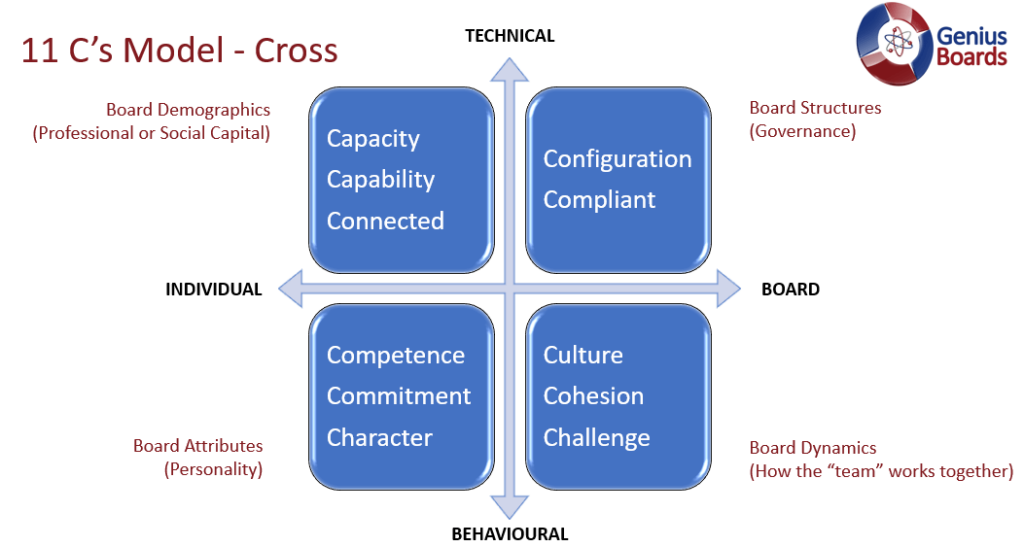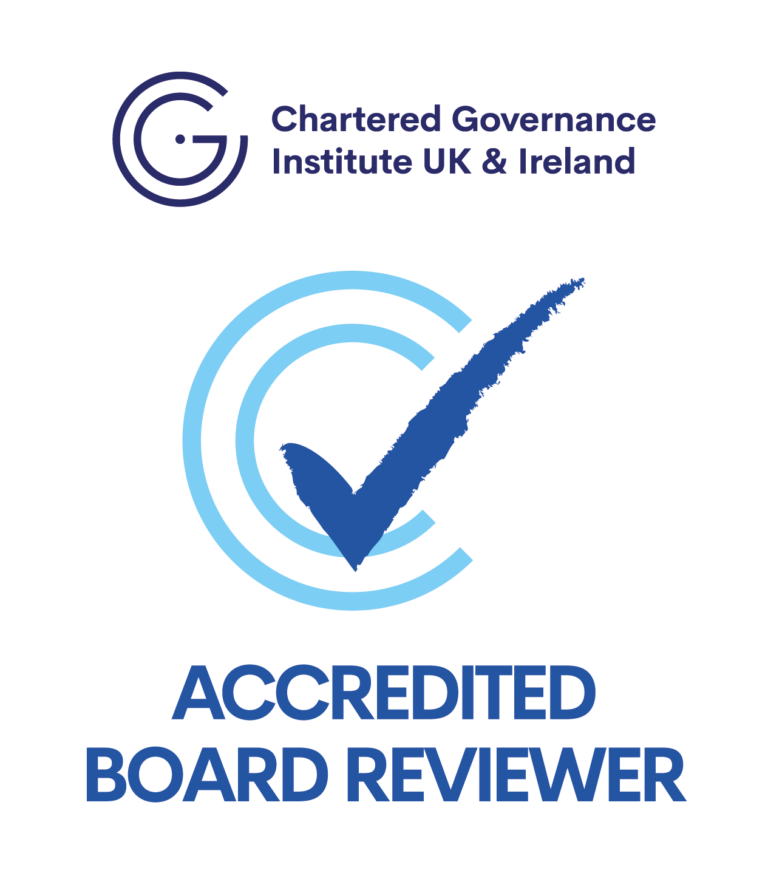Article Three of a total of seven Attributes Articles
In our previous weeks’ article series, Genius addressed “Board Structure” and “Board Demographics” and their influences on Board effectiveness.
This mini-series, Genius is addressing the three “Board Attributes” topics of Competence, Commitment, and Character.
To keep reading easy, Competence has been split into three Articles – Within the Role, Leadership and Engagement, 21st Century & Governance Competence (this article).

Board Attributes addresses, within the physical people appointed to the Board, their collective personalities, and how these factors impact on Board effectiveness.
Competence
Competence addresses how the Director delivers on their responsibilities. Competence encompasses a wide range of personality influenced factors that we shall review.
3. 21st Century Competencies
a. Resilience
Resilience is about mental, physical, and capability; it is about handling stress, responding in times of crisis, managing during transitional times, AND taking difficult decisions, whilst remaining mentally and emotionally balanced.
Without resilience there is the risk of wrong decisions – evidence states that we lose 20% of our capability in a crisis. Without resilience, there is the risk of treating other people inappropriately, and equally the risk of not being able to continue in the role due to the pressure.
Resilience is gained through experience, and through self-training to cope in such times. Some will manage better than others.
Part of resilience is keeping mind and body fit, having enough sleep, and eating correctly.
Another ally to resilience is to have resilience within the team to draw on when needed, each supporting the other for ongoing collective resilience.
A resilient leader will naturally earn the trust of followers as they know they will make the right decisions, no matter the complexity or difficulty.
b. Agility
An agile body moves smoothly and effortlessly. An agile mind can move from one point of discussion to another seamlessly, able to absorb the different complexities with ease.
Another important ability of agility is to recognise the need to change a decision. Agility in a time of conflict or crisis is important in a leader allowing the necessary decisions to be taken and retain (or gain) the respect of the team or followers.
Agility, to consider the various options with clarity and to make the right decision, singularly or collectively as a team delivers clarity of leadership, and respect is earned.
c. Cultural EQ
Globalisation of economies and business means that we interact with different cultures, as customers, as business partners, stakeholders, and in the boardroom. Understanding other cultures and how Directors from other countries will behave is critical to maximising their contribution and managing the dynamics and diversities to keep the team working effectively together.
Cultural IQ is probably better known than Cultural EQ, but given this is about people, cultures, behaviour, and engagement, a core skill needed from the Directors is empathy and, equally, listening. Therefore, in my view, this is an EQ not an IQ conversation.
Some terms in different languages, even different English have different meanings. A simple example is the word “just now” – in Scotland it means right away, in South Africa it means at some point it suits me, but not right now; A totally opposite meaning in two English speaking cultures.
Cultures between the UK and the US will throw up differences, as they will with the different European, Middle Eastern, and Asia territories. The UK is typically polite and business-like, many other cultures are a lot more vocal and say clearly what they mean, yet others will be very deferential to hierarchy.
Not understanding Board colleagues and how to make the most of their offering would be unfortunate, and it is the responsibility of all Directors and the Chairman to work with all the component parts within a team.
d. Digital IQ
Directors do not all have to be digital whizz kids, but what all Directors can do is engage their common sense and ask sensible questions, insisting they received “English” answers.
To complement this, it is important, depending on the nature of the business to have a degree of digital competence within the Board. Some businesses find that using a consultant can work to support Board conversations rather than find the right Director who has digital skills.
In some cases, the digital skill will bring an age diversity to the Board at the same time, this comes with the proviso that the person is capable of being a Director and carrying out their fiduciary duty.
Directors should upskill themselves in the relevant digital space that the business is in, and particularly in understanding what digital transformation might mean for that business, such that the right challenges can be made of such a project which typically brings tremendous people, time, and technology complications.
e. Other Quotients
We have talked about five quotients so far, IQ –, EQ, Resilience EQ, Cultural EQ, and Digital IQ.
According to Professor Kakabatse, there are five Quotients – IQ – Cognitive Intelligence, EQ – Emotional Intelligence, MQ – Moral Quotient, PQ – Political Intelligence, and RQ – Resilience Quotient.
In my view there are 10 key quotients, those listed by Professor Kakabatse, the Cultural and Digital Intelligence discussed above, and added to these – AQ – Appetite Quotient, SQ – Strategic Quotient and TQ – Transformation Quotient.
We will cover the various quotients in greater detail in a later article. Briefly, therefore, what are the additional Quotients not yet discussed?
– Moral Quotient – Ethics and integrity, the moral compass of an individual, their views on right and wrong.
– Political Intelligence – The ability to navigate a given environment for the best outcome, working with the people and culture to achieve objectives.
– Appetite Quotient – Having an open mind, having an ability to engage in risk, opportunity, innovation, and growth, etc.
– Strategic Quotient – The ability to think blue skies, to start with a white piece of paper, to engage creative thinking without the trappings of detail.
– Transformation Quotient – The ability to conceptualise the project, the steps, the people, the IT, and the resources, to start, to deliver and to complete on transformational change. For other Directors the ability to engage with the project positively.
f. Engagement style
This section might feel like a repeat but brought into this section to identify the “old school” style of engagement as a Chairman, Director, and a Board and a modern style engagement. The older style being hierarchical and deferential, the more modern style being more open, more diverse, and more inclusive.
A tension will always exist as the time evolves and the younger become the older and the new styles of management evolve.
The “old school” style, sometimes correlates to “male, pale and stale” which is today being heavily challenged by the many diversities and benchmarks changing Board demographics.
Boards need to be mindful that their engagement style delivers the best value to the organisation. Chairmen need to be self-aware of any risk of not being fit for purpose and aware of any Directors that resemble dinosaurs with limited modern agility and open-mindedness.
g. Influence & Team Dynamics
In sections above we have covered influence; both the positive influences and the risks of negative influences. Within the context of 21st-century competencies, we refer to the influence of one person versus the influence of a team.
Today there has been a lot of research and work done in teams rather than mentoring or coaching only the individual, getting not only the person to progress but recognising that can only be successful within a team that progresses.
4. Governance Competencies
a. Role of the CoSec
There is the saying “behind every effective Board is an effective Company Secretary”, the right-hand person to the Chairman, the bridge between the Board and the organisation, the silent witness, the trusted confidant, the facilitator of differences, the home of governance.
The secretariat function has a large amount of governance, administration, and compliance which is carried out by often several members in a department.
The Company Secretary or Board Secretary is either the head of that department or is a specific senior in that department whose key function is to support the Board.
In evaluations, typically the Company Secretary has a particularly good sense of the effectiveness of their Board. They are typically focused effectively on the future of the organisation, its effective governance and seldom have personal agendas that are inappropriate.
The Company Secretary line management reporting should be to the CEO and in their functional delivery should be reporting to the Chairman.
The governance, when working, oils the wheels of efficiency and effectiveness, and when not fully effective, gets in the way of a Board being the best it can be, but can often be a difficult one to put a finger on.
We will cover the role of the Company Secretary in a dedicated article in the near future.
b. Best practice / Code Alignment
Most Chairmen and Directors would naturally wish to comply with given requirements, but there are times that a Board or individual will “fight” compliance.
The Code has evolved since the early Cadbury Code days and today remains a “comply or explain” engagement, does not have a Regulator with teeth, and is outcomes-based.
Therefore, a lot is open to interpretation for those FTSE 350 companies to which it applies but is seen as a guide for best practice and the framework for many other industry Codes.
There is a transitioning to recognising the best practice content of the Code, but there are those that do find governance tedious. The Company Secretary, being the leading governance professional in the organisation often must apply higher levels of EQ to coerce a Board into improving governance and therefore effectiveness.
5. Conclusion on Competence
A Director’s competence is probably one of the greatest areas of Director value add. These are the component parts of the job specification to determine if the individual has the competence to drawn on their skills, experience, and knowledge to bring themselves and the value to the fore and to be able to engage effectively within the team.

















